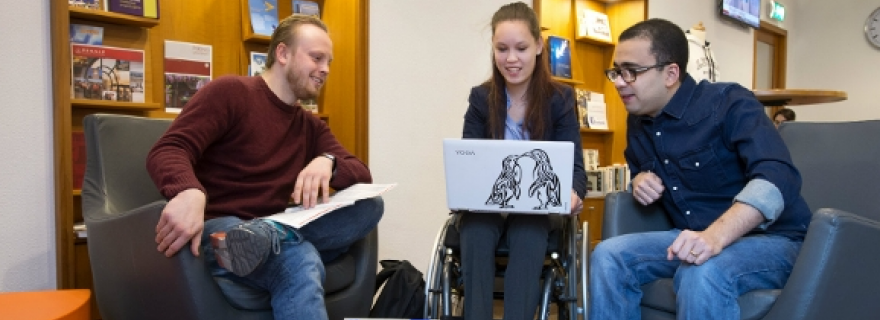Project Drempelloos Studeren: Support For Students With Visible And Invisible Disabilities
This year's theme of International Day of People with Disabilities is invisible disabilities. Two students share their experiences of studying with a disability during the Covid-19 pandemic and introduce the project Drempelloos Studeren.
December 3 is the International Day of People with Disabilities. This year’s theme is invisible disabilities, since not all disabilities are apparent. Chronic pain and fatigue, autism, auditory and visual disabilities, AD(H)D, depression, and learning disabilities such as dyslexia and dyscalculia are various examples of invisible disabilities. These examples demonstrate that invisible disabilities are very diverse and don’t really have a common denominator. On this International Day of People with Disabilities special attention is paid to those with invisible disabilities, to create more worldwide awareness on how we can create an accessible society.
More understanding is needed to create a society in which everyone is able to participate. Leiden University strives to be a reflection of such a society, in which students learn to discover the world. We need to pay close attention to the question of what it means to study with a disability in our academic community. Moreover, current Covid-19 pandemic measures heavily impact students with disabilities. Two students reflect on their experiences with studying during the Covid-19 pandemic and their participation in the project Drempelloos Studeren.
Ruud: Pulling all-nighters
Ruud graduated the BSc Computer Science at the Science Faculty and is currently enrolled in the MA Statistics and Computer Science. He plays the guitar and enjoys photography, in particular architecture and nature. Due to his autism he processes information differently than most people, which influences the way he learns. This can pose challenges, but luckily Leiden University is diverse which makes it easier to identify with peers. “There is always one (or more) fellow student who understands and recognizes the things I struggle with.” Ruud says that the Covid-19 pandemic has drastically altered the concept of studying. Fortunately, student associations continue to organize online activities to stay in touch. “There is less of a barrier for attending online classes and activities, and if it gets too much it’s possible to take a break. You can watch classes later.” At the same time, drawing a line between my study and private life becomes more complicated. “I notice that I’m more occupied with studying outside my regular lecture and contact hours. This results in pulling all-nighters because I’m afraid things won’t go well. It is particularly important to stay in touch with your professors, student counsellor and/or study advisor all the time, but because they have so many responsibilities this can be tricky.”
Stan: One contact person within the faculty
Stan graduated from multiple studies at the Law Faculty and is currently enrolled in the MA specialisation Philosophy of Law, Governance, and Politics at the Faculty of Humanities. In addition to studying he enjoys sports, such as tennis, football and fitness. He also enjoys vegan cooking, travelling, collecting LPs and reading literature and philosophy. Stan is pleased that the university libraries are opened during the Covid-19 pandemic, but he says that study spots aren’t always available. This forces some students to do their studying in the chaotic environment of a student house. He also worries about the amount of attention for individual students. “When a student is struggling to stay connected, it is more likely to remain undetected during the Covid-19 pandemic. The barrier for asking questions and seeking help has become higher. Before the pandemic you could speak to a teacher during the break or after class, but now you have to send an e-mail. A lot of students feel uncomfortable taking that step and they refrain from asking questions altogether.” For this reason, Stan argues for a fixed point of contact within the faculties. “Ideally, there should be a dedicated study advisor within provisions for students with disabilities. Experience shows that various approaches from different staff members can lead to confusion and insecurity. A fixed point of contact helps lower the barrier for asking questions and looking for help.”
Project Drempelloos Studeren
Both Ruud and Stan take part in an expert group from the project Drempelloos Studeren, where staff and students work together on awareness and knowledge-sharing about accessibility and disability in the learning environment. The expert groups also propose improvements with regards to digital accessibility, examination facilities, physical accessibility and expertise. Stan: “I was asked to join the project because I was involved in a student ADHD study group. Within this group, I was always committed to improving the way of doing things. For example creating new weekly planners and exchanging experiences, tips, and tricks for common problems.” Ruud: “Ideally everyone who comes to Leiden University to study is able to participate fully, without any individual facilities. That is of course an ideal, but a mainstream approach including as many provisions as possible would work. The advantage of this approach is that students without disabilities also profit from the improvements we suggest.”
Finally, Ruud would like to have a network for PhD researchers with disabilities. “I myself would like to do a PhD at Leiden University, but there is little support for students with disabilities here.” Support is very important for students with disabilities. Ruud: “Sometimes it feels like you have to prove your disability to your professor before they accept it. I’m working on improving the way in which the university can facilitate a better understanding between students with disabilities and their teachers.” In the project Drempelloos Studeren, students are active participants in the expert groups. Their personal experiences have shown them where challenges lie and how we can make our university truly more inclusive.


0 Comments